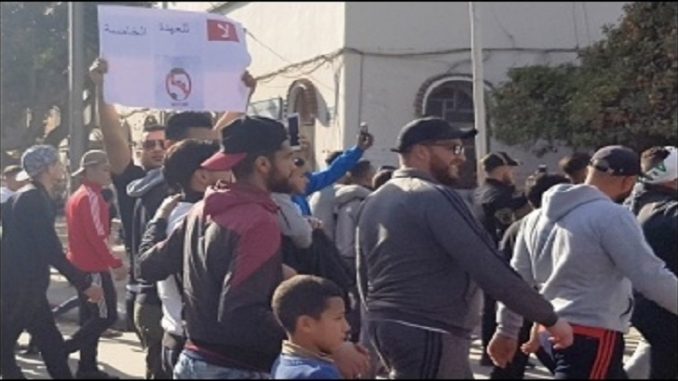
Every Friday, since 22 February, hundreds of thousands of Algerians have been protesting against their infirm president – the figurehead of a decades’-long ruling clique – who is standing for a fifth term of office.
These outpourings of anger against 82 year-old President Abdelaziz Bouteflika are the biggest since the 2011 mass uprisings across the Middle East and North Africa.
One protester in the capital Algiers, a 37 year-old teacher, said: “We stay here until the whole system goes”.
A five-day general strike, involving transport workers, dockers, car workers, shop workers, teachers and workers in many other sectors, began on 10 March. Another three-day general strike to remove Bouteflika began on 26 March.
In order to prevent revolution ‘from below’, the regime has introduced reforms ‘from above’. It announced that Bouteflika will not now seek a fifth term and installed a new prime minister, Badawi, with talk of an ‘inclusive government’.
But the planned 18 April presidential election has been postponed indefinitely, leaving Bouteflika in office. Needless to say, these ‘reforms’ have failed to halt the protests.
“They are just trying to delay things until they have a candidate who suits them. We want him gone. We want them all gone”, said one protester.
Bouteflika had a stroke in 2013 and has seldom been seen in public since. Algerians call him their ‘invisible president’. His last public speech was seven years ago.
But he remains in office as a puppet figure fronting a corrupt and autocratic elite made up of the top military, party cronies and wealthy businessmen and widely known as ‘le pouvoir’ (‘the power’).
Opposition
Most opposition parties do not want the movement to overthrow the system. Instead they want a reshuffle of the regime which is more favourable to them in terms of positions and privileges.
The opposition’s call for Friday demonstrations steadily escalated, but on the evening of 3 March the protests exploded onto the streets after a spokesperson had announced the president’s intention to stand again and vacate the presidency after one year.
Opposition party leaders are reportedly engaged in talks with the regime for concessions and have attempted to hold back the movement by warning of ‘chaos’ and ‘bloodshed’ if the protesters try to overthrow the ruling class.
Youth to fore
Over half of the population is under 30. Most young people have known only one ruler and did not experience the “dark years” of civil war, in which around 200,000 Algerians lost their lives.
The universities have emptied as countless thousands of students have thronged the streets.
The education ministry, in order to cut across the developing student movement, brought forward the spring holiday originally scheduled for 21 March and extended it until 4 April.
Bouteflika was initially seen as the ‘mediator’ who ended the horrors of civil war, but even among the older generations there is no longer any loyalty and patience.
Unemployment officially stands at 10% and youth unemployment is 29%. In 2015 it was estimated that 35% of the population somehow survive on a poverty wage.
Most households have seen their incomes decline substantially during the last five years.
This fall in living standards corresponds to the sharp fall in wholesale oil and gas prices, the mainstay of the economy.
Bouteflika had previously used burgeoning oil and gas export revenues to subsidise consumer commodity prices and invest in social programmes. But these subsidies and social spending have gone into reverse.
However, sections of the elite have become filthy rich. Many Algerians have long been saying: ‘We are a rich country, we have oil and industry – why are we not rich?’
Apart from the Friday protests, all election candidates have threatened to withdraw and now the ranks of the protesters have been swelled by members of the official trade unions.
Traditionally loyal to the FLN (the National Liberation Front – Bouteflika’s party – that led the 1954-62 struggle against French colonialism) union leaders belatedly withdrew their support for Bouteflika and backed the 10 March general strike.
The strike was widely supported, including by workers in the crucial oil and gas industry (which accounts for 30% of the country’s total economic output).
Wanting to distance themselves from Bouteflika’s rule, even some large private companies publicly supported the strike.
And in a desperate attempt to stop its haemorrhaging support the FLN’s interim leader Moab Bouchareb announced support for the “popular movement”, while also backing Bouteflika’s non-existent political reforms.
In a new twist a FLN spokesperson has now rejected Bouteflika’s call for a ‘national conference’ to prepare for new elections. Clearly the ruling class is split on how to proceed.
Women have already played a prominent role in the protests and marked International Women’s Day (8 March) by leading mass demonstrations.
Existential threat
The regime, while so far limiting its use of force against the protests, is likely at some stage, if existentially threatened, to use the full weight of the state against protesters.
However, as we have seen during periods of struggle in the ‘Arab Spring’ and in the 1979 Iranian revolution, the state forces can crack under enormous pressure.
In order to achieve this movement’s aims and prevent counter-revolution at a later stage, a working-class mass movement must forge strong, independent organisations which not only challenge the rule of the regime but also the capitalist system which underpins it.
Strikes and protests on different issues, including opposition to the official trade union and the right to elect new workers’ representatives, are developing.
Recently 13 independent trade unions have declared their opposition to Bad-awi’s attempt to form a government.
This opposition needs to be broadened into a movement to replace the present regime with a government led by representatives of workers and the poor. One that breaks with capitalism and begins the socialist reorganisation of society.

Be the first to comment